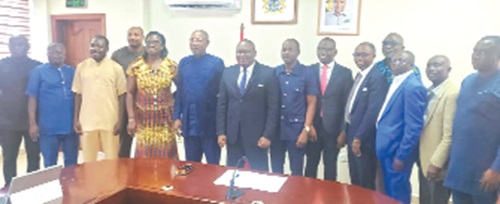The Ministry of Education has tasked the Ghana Accountability for Learning Outcomes Project additional funding two (GALOP AF2) Oversight Committee to reaffirm its shared commitment to ensuring learning for every child in Ghana.
“Together, let us show that when oversight is rigorous and collaboration is genuine, transformative learning outcomes are not just possible, they are inevitable,” the Deputy Minister of Education, Dr Clement Apaak, has stated.
Addressing the first committee meeting on behalf of Mr Iddrisu last Monday at the Ministry of Education, Dr Apaak reminded the members that as a community, “our effectiveness will be measured by the clarity of our direction, the quality of our oversight and the responsiveness of our system to on-the-ground realities.”
GALOP AF2
The GALOP AF2 will support four main areas - Strengthen teaching and learning through support and resources for teachers; strengthen school support, management and resourcing; strengthen accountability systems for learning; and technical assistance, institutional strengthening, monitoring and research.
Using a results-based financing approach, the World Bank will act as GALOP’s grant agent by disbursing funds to the Ministry of Education, which is responsible for delivery based on the achievement of pre-determined performance-based conditions
Objectives of GALOP
Dr Apaak reminded the committee members that it was established to provide overall strategic direction and exercise high-level oversight of the GALOP AF2, to ensure that the project activities were effectively implemented, aligned with the ministry's education sector priorities.
He said the objective of GALOP was to improve the quality of education and learning outcomes in basic education schools with a deliberate focus on equity, accountability and system strengthening.
“This is being achieved through targeted interventions that address the root causes of low learning outcomes, particularly in the most underserved and low-performing basic schools.”
“As many of us have come to know, GALOP seeks to achieve improved literacy and numeracy proficiency at the early grades, through structured pedagogy, curriculum alignment, and effective use of assessment, such as the National Standardised Test,” the deputy minister said.
He said the objective of the GALOP was to provide teachers with continuous professional development, including in-service training, coaching and digital learning content that enhances instructional delivery and learner engagement.
“You must prioritise support for the lowest-performing 10,000 basic schools, many of which are located in rural, hard-to-reach and economically disadvantaged areas.”
“Ensure inclusive education by addressing the needs of vulnerable learners, including girls, children with disabilities, and those in marginalised communities,” Dr Apaak added.
He also said the objective of GALOP was to deliver resources such as school grants, teaching and learning materials, and digital tools in a targeted and equitable manner.
Funding partners
Dr Apaak commended the funding partners for their sustained commitment to the success of GALOP, stating that GALOP AF2 provided an additional US$117.1 million to scale up targeted interventions in basic schools.
“I would like to take this opportunity to express our deep appreciation to the SCALE Funders, World Bank, the Global Partnership for Education (GPE) and all funding partners for their sustained commitment to the success of GALOP.”
“We must ensure that every intervention from teacher training and school grants to performance-based incentives is efficiently deployed and monitored,” Dr Apaak stated.
A representative of the philanthropic partners in the SCALE Consortium Samuel Kembou, who also works with the Jacobs Foundation was happy of being part of the process to contribute collectively to shaping the future of educational outcomes for the children in the country.
Email: severious.dery@graphic.com.gh

